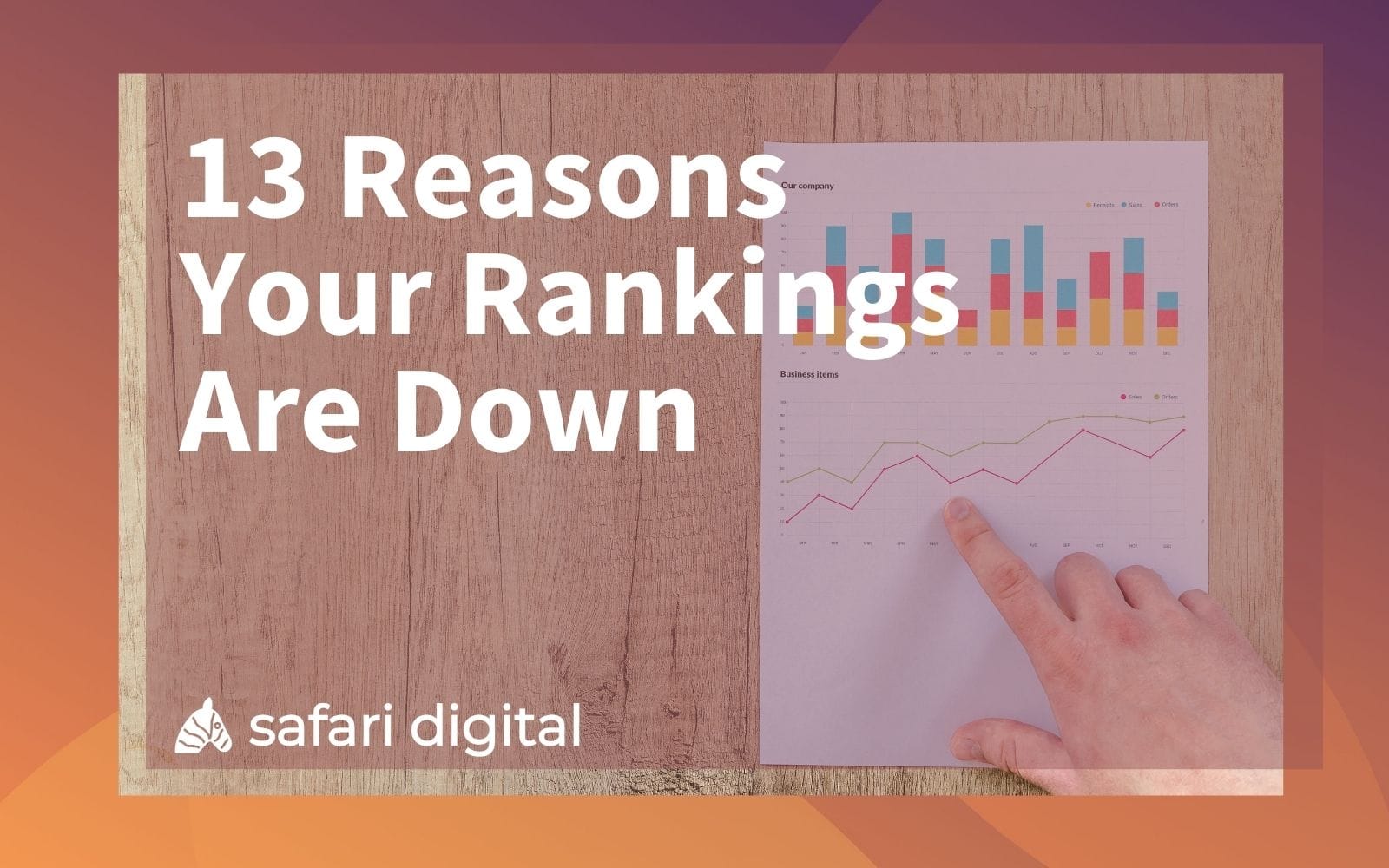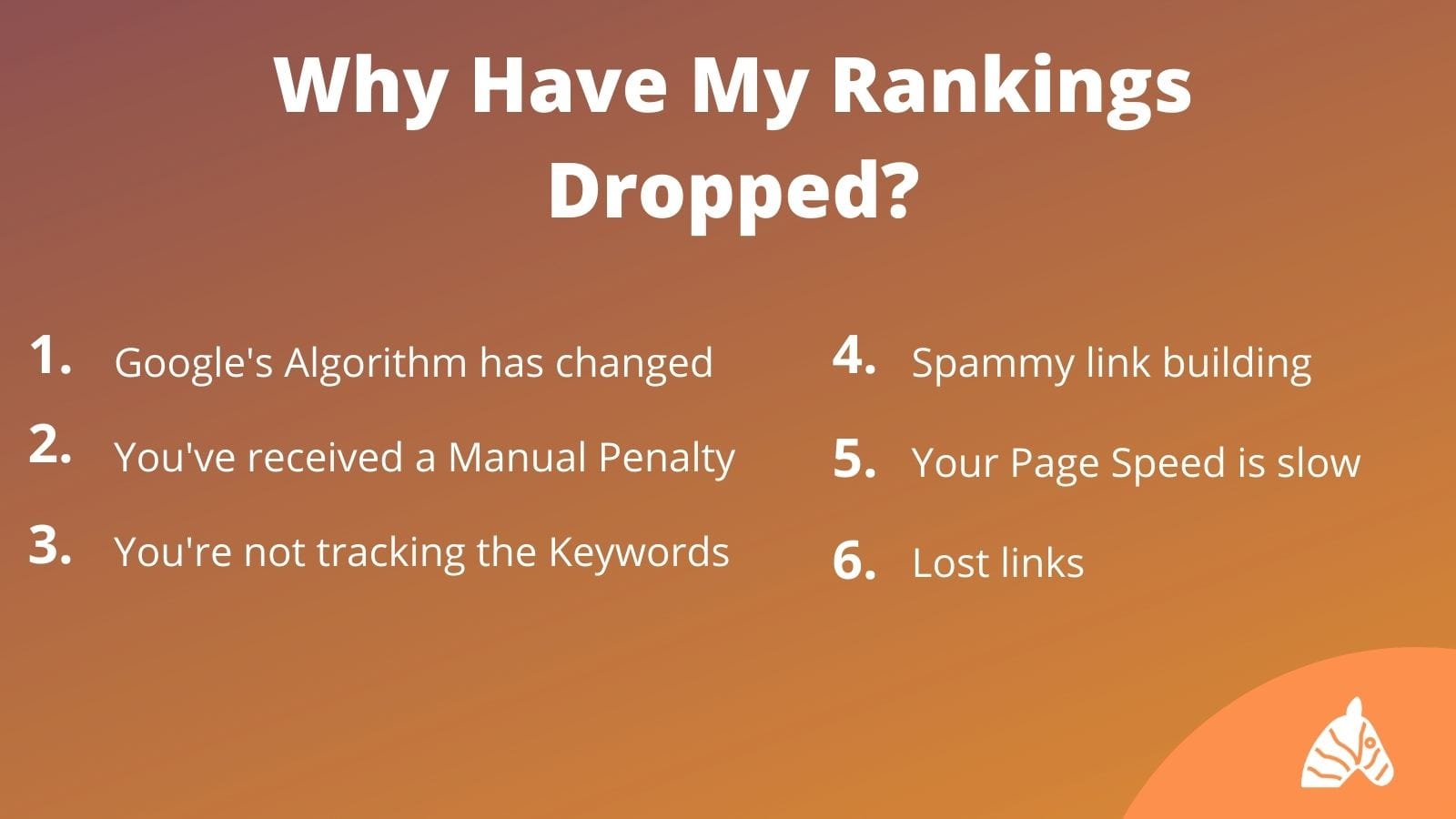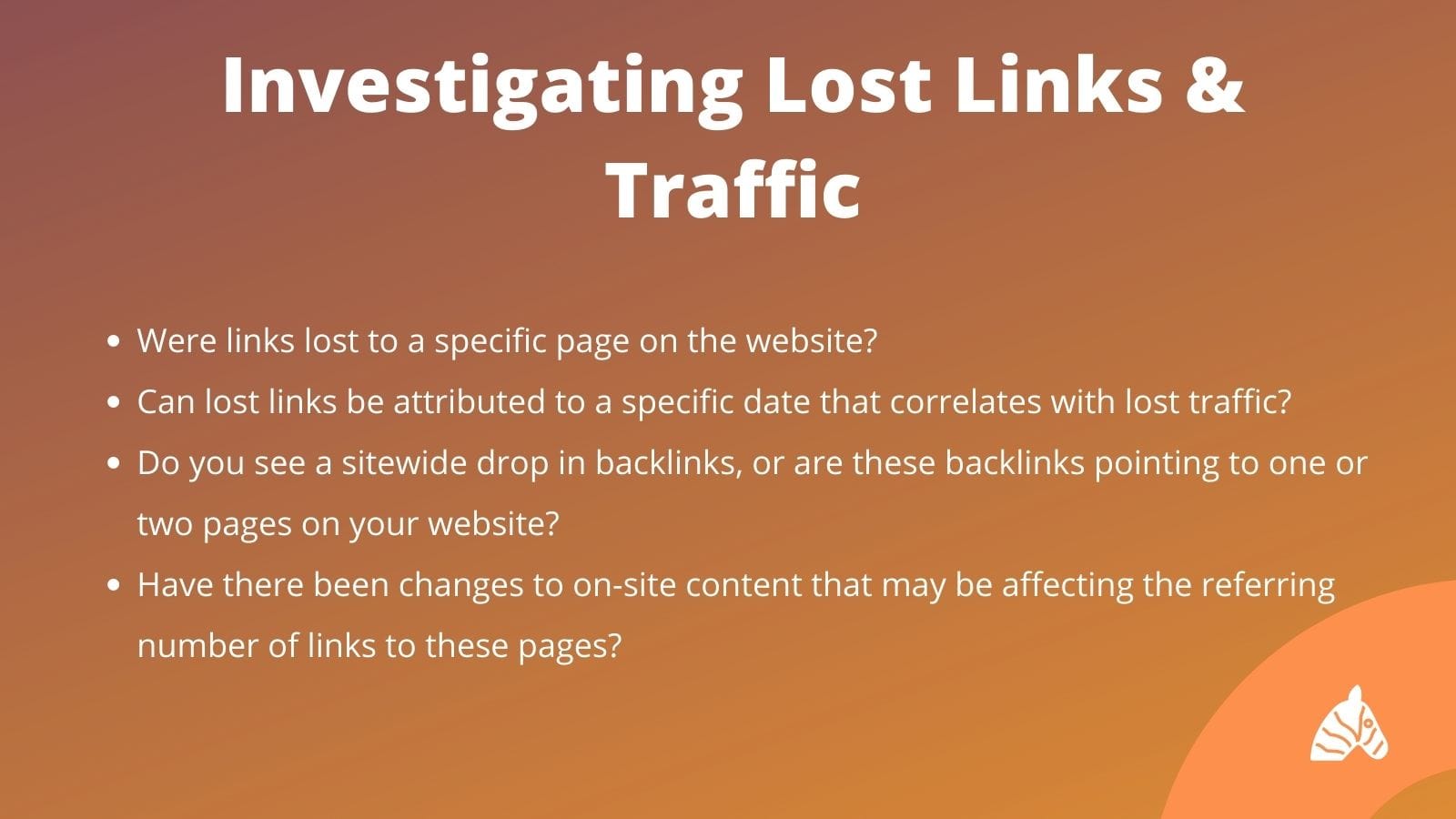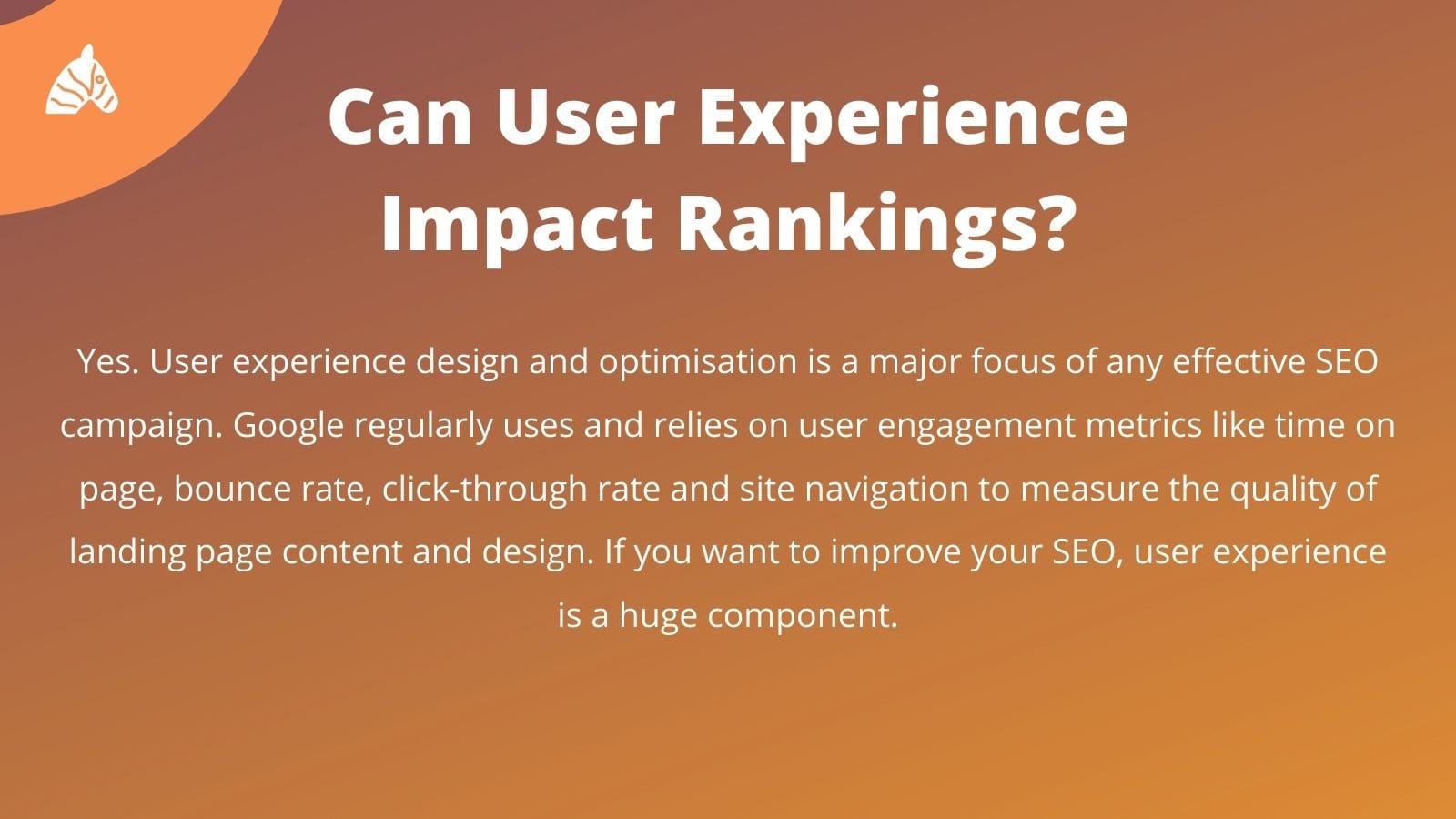
Have you noticed an SEO ranking drop or traffic change? Let’s look at some of the most common reasons why organic rankings and traffic may change.
Have you noticed a sudden decline in your website traffic? Have your search engine rankings recently plummeted? There is a myriad of reasons why your website is being negatively impacted in search engine results, and it can be exhausting trying to get to the root of the problem of an SEO ranking drop.
However, if it feels like you’ve done everything correctly, and you have been implementing sustainable, ethical white-hat SEO practices. In that case, there may be a simple explanation and solution for your website’s performance.
To help you understand what can cause a sudden change in search, Safari Digital have put together the 13 most common reasons for an SEO ranking drop. In some cases, there is a simple solution to the problem. Other causes of an SEO ranking drop in traffic may require addressing multiple aspects of your website. Whether you’re an SEO expert or a business owner, investigating and successfully mitigating the problem is the key to getting your website back on track.
Here are 13 Reasons You’re Experiencing an SEO Ranking Drop:
1. A Shift in Google’s Algorithm
Changes in Google’s algorithm is one of the most likely reasons for an SEO ranking drop. With more than 200 factors influencing Google’s algorithm, the equation that search uses to present websites can change for various updates at any one time. While most algorithm shifts are put in place to favour websites with great content and user experience, Google’s algorithm changes can also be extremely volatile and, in some cases, deliver ruthless outcomes for websites.
The nature of SEO means that we never know what Google’s algorithm changes will mean for a website. The primary job of an SEO expert is to adapt, prepare, and where possible, anticipate future algorithm shifts. The only way of doing so is to implement sustainable SEO tactics that are in line with Google’s core mission of providing good, useful content to its users.
If you think Google’s latest algorithm shift has impacted you, do some research on whether other websites have also experienced a change in traffic, and you may be able to decipher where you went wrong and where you can improve.
2. You’ve Received A Manual Action
A manual action refers to a penalty against your website, rather than an SEO ranking drop that has resulted from algorithm shifts. Manual actions are presented by a human reviewer of your site when it is considered not compliant with Google’s Webmaster Quality Guidelines. Most manual actions occur due to someone attempting to manipulate search engine results in favour of their website.
If you see an abrupt drop in website rankings on Google but not on Yahoo or Bing, this is an almost sure sign that Google is penalising you. Whether you’re being presented with automatic or manual action, fixing the problem and getting the penalty removed is your first step to recovering any traffic. You can start by seeing if there are any notifications from your Google Search Console account. From there, you’ll need to go through your site and immediately fix and repair the offending material. Common manual actions include user-generated spam, unnatural link building, sneaky redirects, thin content and hidden content.

3. You’re Not Tracking the Right Keywords
The keywords that your customers or readers may use to find your content may be entirely different from the keywords that you deem to accurately reflect your site. Suppose you’re in a relatively technical industry. In that case, your idea of a “logical” keyword for your products or services is probably entirely different from what your customers may use to find said products or services.
Updating your SEO strategy to align with your audience’s intent is crucial to both obtaining and measuring organic traffic.
If you’ve experienced a dramatic loss in organic rankings, have a look at your keywords and key phrases. If you’re using old, generic or complicated keywords, you’re potentially tracking the wrong rankings and need to update your strategy to align with your consumers. If you want to update your keyword strategy, you need to think like a customer, study your competition and use a third-party keyword tool like SEMrush.
4. Spammy Link Building
If you’ve acquired some dodgy backlinks to your website, you may be looking at a Google Penalty. A backlink is not just a backlink – it’s a vote of confidence to your site. And if you’ve got some spammy links or negative links coming into your site, Google will notice.
The search giant clearly states that they are well-aware of low-quality link building tactics and penalise websites for engaging in such tactics. If Google notices your website engaging with low-quality link schemes, you may be de-ranked from search results, resulting in a significant SEO ranking drop in results and traffic.
5. Your Pages Aren’t Fast Enough
Page speed is only becoming more critical to a website’s success in 2021. How fast your pages and content loads not only puts Google off from ranking your website well but will also provide a poor user experience for those experiencing long wait times.
To check the page load speed of your site, use Google’s PageSpeed Insights tool. The tool will analyse a page’s performance and load speed, and pages are ranked fast, average and slow, depending on how quickly they load. Page Speed is definitely one of the first things to check when experiencing a drop in SEO rankings.
6. Lost Links
If you’ve lost links on your site, that may also contribute to a drop in rankings. You can use a third-party tool like Ahrefs to track your backlink profile and check your site for lost links over the last 90 days.
If your site has lost links, you may be able to trace that back to fluctuations in particular page rankings. If you have noticed a number in the total number of referring domains or backlinks, here are some questions that are worth investigating:

1. Were links lost to a specific page on the website?
2. Can lost links be attributed to a specific date that correlates with lost traffic?
3. Do you see a sitewide drop in backlinks, or are these backlinks pointing to one or two pages on your website?
4. Have there been changes to on-site content that may be affecting the referring number of links to these pages? For instance, if the page was providing a specific answer to a question, you may have lost links due to removing this content.
To prevent lost links from impacting traffic in the future, it’s worth investing in a third party tool that can track and monitor your backlink profile. This way, you can take corrective measures and prevent a loss in traffic before the loss properly impacts your website.
7. Your Competitors Are Doing Something Well
Experiencing an SEO ranking drop in rankings or web traffic may not have anything to do with your own website. Moreover, the reasoning behind the sudden change may have something to do with your competitors stepping up their game.
The amount of work needed to outrank in your industry is entirely contingent on your competitors. Regardless of whether you’re in SEO, you’re selling wax candles, or you’re a plumber in Sydney, the key to doing well through organic search is staying one step ahead of your competition.
If you’ve noticed a drop in your rankings, it may just be that your competitors are doing something better than you. Whether it be obtaining more high-quality backlinks, or they’ve extended and updated their content, your rankings may not reflect something that you have done; more so, what your competitors are doing better.
8. Poor Redirect Strategy in Place
A well-mapped out redirect strategy is the key to successfully launching a new website or migrating to a new server. Unless you have a proper redirect strategy in place, you will likely see a drop in both traffic and rankings if you’re doing any structural changes to your website.
Think of a 301-redirect plan as a change of address notice for Google. The notice will tell search engines that either a page, several pages, or your entire website has been moved to a new address. You’re essentially asking that your new website visitors are sent to your old address and not your old one.
A 301 redirect plan needs to ensure that all XML sitemaps, canonical tags and links are also updated. If executed correctly, a redirect strategy will save your website from a drop in traffic. Successfully implementing a redirect strategy also means letting Google know that you haven’t produced duplicate content – you’ve merely updated the address at which the content sits.
9. That’s Just the Nature of Search
As well as the constant changes to Google’s search algorithm, natural changes to search that occur every day can impact a website’s traffic and rankings. Google search regularly changes to meet the demands of the user. For example, if there is a sudden increase or trend in a search topic, Google may present newer results or news articles in the top first positions, pushing static content down.
If you’ve noticed an SEO ranking drop after an increase in awareness of your product, service or industry, Google may be trying to provide the newest and most relevant material for the growing trend. You can monitor and check Google Trends tool to see if there any changes that may explain why your website is being outranked by new material.

10. You’re Tracking Rankings Incorrectly
Did you notice that your rankings were down while making the search yourself? If so, you need to stop checking rankings through search immediately. Your geographical location, search history and device can impact which results are being shown to you and how they will rank. Have you ever made a search on Google on two different devices to be shown completely different search results? This is Google’s way of personalising search results to present you with the content it thinks you want to see.
By constantly searching your target keywords and clicking on your website from search, you’re engaging in click manipulation – not only does this mean you’re not being shown accurate search results, but click manipulation can also be deemed as an unethical SEO tactic that can land you a manual action.
If you want to track your rankings from an unbiased source, use a third-party tool. There is an abundance of rankings tools available that provide live, unbiased rankings from your city or country. Using any third-party ranking tool means that you can track your search engine rankings without having personalised results presented to you.
11. Server Problems
Another reason that can contribute to a loss in organic traffic is issues with your server. If your site encounters server problems, it may lead to a broken caching function, an empty Markup served to search engine bots or even a major problem preventing indexing.
If you believe you’re having traffic issues due to your server, you can take steps to mitigate the damage. Monitor for errors in server logs and use Google’s Fetch and Render tool to check and test how a URL on your site renders and crawls.
12. Your UX Needs Work
It’s all well and good to have your site set up to meet the demands of Google’s algorithm, but it’s what you do with good rankings and traffic that matters. Once users make it onto your site, they will abandon the page if they are not satisfied with the experience.
While Google has never confirmed it, research suggests that time-on-site and page bounce-rate can impact your search rankings. If Google notices that users are continuously leaving after landing on your site, they will subsequently find another site that offers a better user experience to take your place in search results.
Optimising your website’s on-page experience can go a long way in making sure that you satisfy your users’ needs.
13. Duplicate Content is De-Ranking Your Pages
Duplicate content refers to blocks of content that are present in two or more places on the web. Duplicate content can seriously impact your rankings. If blocks of content are deliberately duplicated to manipulate search engine rankings, your site will get penalised. If you have the same or very similar content across your entire website, you may also be inhibiting each page’s chances of ranking in search engine results. An SEO ranking drop could very well be due to multiple versions of the same content.
Talk to An SEO Expert
These are just some of the most common reasons for an SEO ranking drop. More than 200 factors contribute to Google’s search algorithm, each of which has its own set of best practices and regular updates. If you’re still having trouble determining the cause of your lost traffic, your best chance of successfully regaining your rankings is seeking the professional help of an SEO expert.
There are no shortcuts when it comes to increasing your search presence and website traffic. We’ve said it before, and we’ll say it again – SEO is a long-term game. If you’re willing to cut corners in the process of optimising your website for search, your business is inevitably going to suffer. You can avoid these issues by implementing safe, ethical and sustainable SEO practices that satisfy current guidelines and continue doing so as Search advances. Keep informed about the latest updates and best practices with Safari Digital, or talk to one of our experts today about how you can increase your online visibility and grow your business with an SEO Company.






